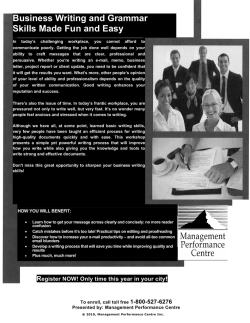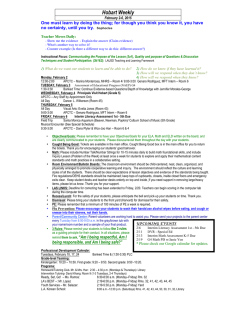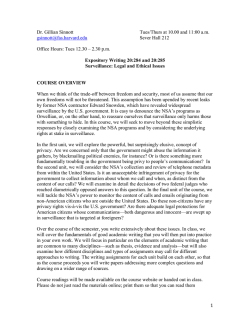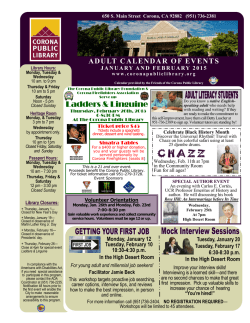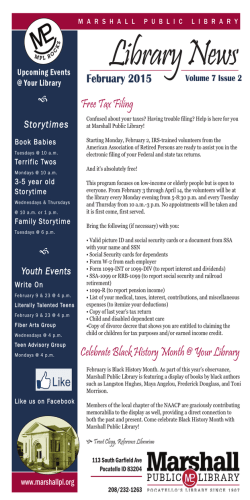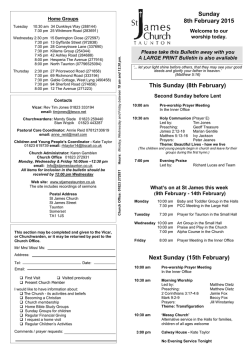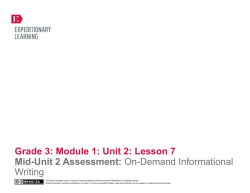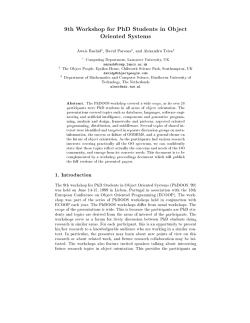
Spring 2015 Syllabus - Harvard College Writing Program
February 2015 The Rise of China Monday Tuesday Wednesday Thursday Friday Saturday Sunday 1 2 3 Introductions 4 5 6 7 8 11 12 13 14 15 18 Thesis, Argument, Introductions 19 Response paper 1.2 due 20 21 22 25 26 Conference Draft 1 Due 27 28 Elements of Academic Writing 9 Close Reading (Analysis) 10 Response Paper 1.1. Due 16 Presidents’ Day (class cancelled) 17 23 24 (Mis)using Sources Discovery Draft 1 Due Analytical Questions Transferability: Close Reading March 2015 Monday Tuesday Wednesday Thursday Friday Saturday Sunday 1 2 3 Draft Workshop 4 5 6 7 8 11 Transitions, Roadmaps, and Signposting 12 13 14 15 18 19 20 21 22 25 26 27 28 29 Unit 2 Starts! Theoretical Lenses Conference Week 9 10 16 17 Structuring Paragraphs Revised Essay 1 Due (this week) Spring Break Spring Break 23 24 Conclusions Structuring Papers Response Paper 2.1 Due 30 Transferability: Research Papers Across Disciplines (Hoopes Prize) Essay 2 Conference Draft Due 31 Essay 2 Discovery Draft Due April 2015 Monday Tuesday Wednesday Thursday 1 Friday Saturday Sunday 2 3 4 5 9 10 11 12 16 17 18 19 Draft Workshop Conference Week 6 7 8 Incorporating Secondary Sources Unit 3 Begins! Unit 2 Revisions Due (this week) 13 14 Summary and Paraphrase 15 Library Session Preliminary research due Annotated Bibliography Due 20 21 22 Structuring Research Papers 23 Discovery Draft Due 27 28 29 30 Plagiarism Course Evaluations + Style Draft Workshop Last Day of Classes! 24 25 26 Conference Draft Due Expos 20.192/20.193: The Rise of China Monday/Wednesday 1-2 & 2-3, Sever 101 Preceptor: Sara A. Newland Email: [email protected] Office: 1 Bow Street, Room 236 January 29, 2015 1 Course Description If the 20th century was the “American Century,” will the 21st be (as the New York Times labeled it in 2004) the “Chinese Century”? As the locus of global economic growth shifts to Asia, what cultural and political changes will accompany this transformation—for those living in China as well as those outside it? Does the rise of China represent a military threat, a competing set of values, an opportunity, or some combination of the three? In this course, we will examine the causes and consequences of China’s dramatic ascendance as a global power. Relying on sources ranging from oral histories to Wikileaks cables, we will analyze both how China is changing and how people across the globe understand China’s relevance to their own lives. We will begin by reading oral histories and short fiction about entrepreneurs, factory workers, and rural-to-urban migrants, focusing on the changes these di↵erent social groups have undergone in the reform era. In Unit 2, we will read about Internet censorship, environmental activism, and the growing Chinese middle class. We will use these examples as a test of modernization theory, which argues that economic development sets in motion a process of social change that ultimately leads to democratization. In the final unit, students will conduct original research on China’s rise in the international political arena, drawing on Wikileaks cables as well as secondary literature. This course will be especially useful for students with an interest in the social sciences or in China, but will also include discussion of good writing practices across disciplines. 2 2.1 Policies Attendance Because Expos has a shorter semester and fewer class hours than other courses, and because instruction in Expos proceeds by sequential writing activities, your consistent attendance is essential. If you are absent without medical excuse more than twice, you are eligible to be officially excluded from the course and given a failing grade. On the occasion of your second unexcused absence, you will receive a letter warning you of your situation. This letter will also be sent to your Freshman Dean, so the College can give you whatever supervision and support you need to complete the course. 1 Only medical absences and absences for religious holidays can be excused. In the case of a medical problem, you should contact your preceptor before class (or at least within 24 hours) to explain. If you do not do so, you will be required to provide a note from UHS or another medical official, or your Freshman Dean. Absences because of special events such as athletic meets, debates, conferences, and concerts are not excusable absences. If such an event is very important to you, you may decide to take one of your two allowable unexcused absences; but again, you are expected to contact your preceptor beforehand if you will miss a class, or at least within 24 hours. If you wish to attend an event that will put you over the two-absence limit, you should contact your Freshman Dean and you must directly petition the Expository Writing Senior Preceptor, who will grant such petitions only in extraordinary circumstances and only when your work in the class has been exemplary. Class begins promptly at seven minutes past the hour, and repeated lateness will be considered an unexcused absence. 2.2 Completion of Work Because your Expos course is a planned sequence of writing, you must write all of the assigned essays to pass the course, and you must write them within the schedule of the course—not in the last few days of the semester after you have fallen behind. You will receive a letter reminding you of these requirements, therefore, if you fail to submit at least a substantial draft of an essay by the final due date in that essay unit. The letter will also specify the new date by which you must submit the late work, and be copied to your Freshman Dean. If you fail to submit at least a substantial draft of the essay by this new date, and you have not documented a medical problem, you are eligible to be officially excluded from the course and given a failing grade. 2.3 Academic Honesty Throughout the semester we’ll work on the proper use of sources, including how to cite and how to avoid plagiarism. You should always feel free to ask me questions about this material. All the work that you submit for this course must be your own, and that work should not make use of outside sources unless that is explicitly part of the assignment. Any ideas or quotations that you take from other sources must be cited appropriately, a skill we will practice throughout the semester. Any student submitting plagiarized work is eligible to fail the course. Please note that this policy also holds for “self plagiarism,” or copying work that you have written, in part or in whole, for another course. If you have written a paper in another class that you would like to use as the basis for one of your Expos 20 papers, you must speak with me first. The same holds for turning in one of your Expos 20 papers in another course: you may not do so without my express permission, as well as the permission of the other course’s instructor. In this course, you will collaborate with other students in a number of ways: exchanging ideas, reading each others’ work, and so on. Sometimes, this collaboration will be required. When it is not, you are still welcome–and encouraged–to seek out feedback from, and provide feedback to, your classmates. I also encourage you to meet with the tutors at the Writing Center. If your ideas for a particular paper are heavily influenced by your conversations with a classmate or a writing tutor, please cite the other student’s contribution in a footnote at the beginning of your paper, as is conventional in academic writing. While I encourage you to exchange ideas with 2 other students, all written work must be entirely your own. 2.4 Electronic Submission of Work You will submit much of your work electronically this semester, generally via the dropbox function on the course isite. You may submit your paper in .doc, .docx, or .rtf format. It is your responsibility to ensure that your paper has uploaded correctly and can be opened and read. If I cannot open your file, or if it is empty or incomplete, your paper will be counted as missing and subject to the late work policy outlined below. If you have any concerns on this front, you are always welcome to submit an additional paper copy to my mailbox. 2.5 Grading I will grade only the final version of your essays, not the drafts or response papers. Course grades will be determined as follows: Essay 1 Essay 2 Essay 3 Participation 25% 30% 35% 10% Grading will become more stringent as the semester progresses since I expect you to develop as a thinker and writer. Please be advised that final grades are indeed final. I will not read or grade a further revision of a revision. 2.6 Late Work Late papers will be docked a third of a letter grade if they are turned in within 24 hours of the deadline, two thirds of a letter grade if they are turned in 24–48 hours late, and a full letter grade if they are turned in 48–72 hours late. Papers that are more than three days late will not be accepted, and will receive a failing grade. 2.7 Electronic Devices Our class time is short and the temptations of the Internet are strong. To ensure that our meetings are focused and productive, I ask that you refrain from using a laptop, iPad, cell phone, or any other device with a screen during class. If it is absolutely necessary that you use an electronic device in class, please speak to me individually. 2.8 Email and Office Hours Please feel free to contact me with questions, appointment requests, and the like at [email protected]. I will respond to every email within 24 hours, and often sooner. Do not wait until the last minute to email me about a paper; I receive many, many emails before each paper deadline, and may not be able to send you an immediate response. 3 Office hours are a great opportunity for you to get additional feedback on your work or just continue a conversation that we began during class—please make use of them! My office hours are Wednesdays from 4-5 and by appointment. If you are free during my regular office hours, just drop by (no need to make an appointment). If you cannot meet on Wednesday afternoons, please talk to me after class or email me to set up an appointment. Don’t wait until the last minute to try to schedule a meeting—if you do, other students may have already claimed all the available slots. 2.9 Extensions There are two ways to earn extensions in this class. You may earn up to three 24-hour extensions, which you may use separately or together at any point during the semester. Please note that the privilege of an extension is contingent on your satisfactory performance in the class. If you turn in one or more late or incomplete assignments, or if you are repeatedly late to or absent from class, you may forfeit the extensions you have earned. You may earn a 24-hour extension by: 1. Getting a perfect score on the name and syllabus quiz on Monday, February 9 2. Attending one or more of the China- or writing-related events listed in the “Boston Area Events” folder on the iSite, and writing a half-page description of the content of the event and its connection to something we have discussed or read about in class. If you wish to use an extension, please email me before the assignment deadline to let me know. 3 Schedule Monday, February 2: Course overview Tuesday, September 9: Do: 1. Read the writer’s letter instructions posted in the Course Handouts – Unit 1 folder on the isite. Then compose a writer’s letter and submit it to the isite dropbox by 11:59 p.m. 2. Sign up for an introductory meeting on the course isite. 3. Go to Gnomon Copy (1308 Massachusetts Avenue) to buy the course reader. Wednesday, February 4: Introduction to academic writing Read: 1. Steinfeld, Edward. Playing Our Game, Chapter 1: The Quiet Revolution [course reader] 2. “Elements of the Academic Essay” handout [distributed in class] 3. “Analytical Moves” handout [distributed in class] 4 Do: 1. Jot down some notes to bring with you to class: Which analytical move(s) is Steinfeld making in the chapter? Where exactly does he make them? Circle some places in the text where he makes one of the analytical moves on the handout, and note which move you think he’s making and why. Unit One: A Citizen’s-Eye View of China’s Rise Monday, February 9: Close reading (analysis); names and syllabus quiz Read: 1. Sang, Ye. “A Hero for the Times: A Winner in the Economic Reforms,” in China Candid. Berkeley: University of California Press, 2006. [course reader] 2. Sang, Ye. “Fringe-Dwellers: A Nonofficial Artist,” in China Candid. Berkeley: University of California Press, 2006. [course reader] 3. Sang, Ye. “Chairman Mao’s Ark: One of the Floating Population,” in China Candid. Berkeley: University of California Press, 2006. [course reader] Do: 1. Annotate all three stories as you read: write short margin notes that draw connections between di↵erent passages, note recurrent themes, or simply highlight passages that you find particularly interesting. 2. Review your classmates’ names and study the course syllabus in preparation for the in-class quiz. Tuesday, February 10: Response paper 1.1 (2-3 analytical questions) due to the isite dropbox by 11:59 p.m. Note: I strongly encourage you to read the analytical questions packet (assigned reading for Wednesday, 2/11) before you complete this response paper. Wednesday, February 11: Analytical questions Read: 1. Zhu, Wen. “Wheels,” in I Love Dollars and Other Stories of China. New York: Columbia University Press, 2007. [course reader] 2. Analytical Questions Packet [distributed in class] Do: 1. Annotate “Wheels” (just as you did the oral histories we discussed on Monday). Monday, February 16: Class Cancelled (Presidents’ Day) Wednesday, February 18: Thesis, Argument, and Introductions Read: 5 1. Student writing packet (distributed in class on February 11) Thursday, February 19: Response paper 1.2 due to the isite dropbox by 11:59 p.m. Monday, February 23: (Mis)using Sources Read: 1. “Harvard Guide to Using Sources,” (usingsources.fas.harvard.edu), sections entitled “Why Use Sources?” “Avoiding Plagiarism,” “Integrating Sources,” and “Citing Sources” (focus on on APA citation style). With the exception of “Citing Sources,” be sure to read all subsections of each section. Do: 1. Discovery draft (2-3 pages) due to the isite dropbox by 11:59 p.m. Wednesday, February 25: Transferring skills beyond Expos: close reading Read: 1. Activity instructions distributed on 2/23. Thursday, February 26: Conference draft (4-6 pages) due to the isite dropbox Monday, March 2: Draft Workshop Read: 1. Two conference drafts (distributed via email) Do: 1. Annotate both drafts according to the instructions on the “reading and taking notes on each draft” handout (available on course website) 2. Write a reader’s letter to each of the authors whose papers are being workshopped according to the reader’s letter instructions (available on course website), and bring two copies of each letter to class. Monday, March 9–Thursday, March 12: Essay 1 revision rolling deadline Your final Unit 1 essay is due at 11:59 p.m. seven days after your conference. In other words, if your conference was on Monday, March 2, your revised essay and accompanying cover letter are due Monday, March 9 at 11:59 p.m. Unit Two: China’s Democratic Future? Wednesday, March 4: Using theoretical lenses Read: 1. Lipset, Seymour Martin, “Some Social Requisites of Democracy” (excerpts) [course reader.] 6 Monday, March 9: China’s growing middle class; paragraph structure Read: 1. Osnos, Evan. “The Grand Tour.” The New Yorker, 18 April 2011. [course reader] 2. Read, Ben. 2003. “Democratizing the Neighbourhood? New Private Housing and HomeOwner Self-Organization in Urban China.” pp. 31-34 and 43-59. [course reader] Wednesday, March 11: Environmental activism; transitions, roadmaps, and signposting Watch: 1. The Warriors of Qiugang (documentary, approx. 40 minutes long). Video is available here: <http://e360.yale.edu/feature/the warriors of qiugang a chinese village fights back/2358/>. There will be a showing of the film at 1 Bow Street, date and time TBD. You can also watch the film on your own (online) if you’d prefer. Do: 1. Take notes as you watch. Note the names of key people and places, moments in the film that strike you as especially interesting, and connections to the Lipset text. Since you may use evidence from this film in your paper, it will be helpful to you to think about specific moments in the film that you may wish to refer back to. March 16–22: Spring Break Monday, March 23: The Internet in China; Writing Conclusions Read: 1. Gary King, Jennifer Pan, and Margaret E. Roberts. 2013. “How Censorship in China Allows Government Criticism but Silences Collective Expression.” American Political Science Review 107(2): 326-340. [course reader] 2. Guobin Yang. 2003. “The Co-Evolution of the Internet and Civil Society in China.” Asian Survey 43(3): 405-406 and 417-422. [course reader] 3. “Ending the Essay: Conclusions” [course reader] Do: 1. As you read the King et al. and Yang articles, jot down some notes on the following questions: What are some of the di↵erent purposes that each conclusion serves? In what ways are the two conclusions similar to or di↵erent from each other? Do these conclusions follow any of the tips for what to do (and what not to do!) that “Ending the Essay: Conclusions” describes—and if so, which ones? 2. Response Paper 2.1 due to the iSite at 11:59 p.m. Wednesday, March 25: Structuring papers Read: 7 1. Two theoretical lens essays by former students [distributed in class] 2. handout on reverse outlining [distributed in class] Do: 1. Pick one of the papers you read for today and write a reverse outline of it. Make sure your outline includes the main idea of each paragraph, the role that the paragraph plays in the overall essay (counterargument, background information, etc.), and a brief description of what connects each paragraph to one that follows. Friday, March 27: Discovery Draft (3-4 pages) due to the dropbox at 11:59 p.m. Monday, March 30: Writing beyond Expos: research papers across disciplines PLEASE NOTE: Class meets in the Larsen Room in Lamont Library. Read : Nothing! Conference draft and cover letter due by 11:59 p.m. to the isite dropbox. Wednesday, April 1: Essay 2 draft workshop Read : 1. Two conference drafts (distributed via email) Do: 1. Annotate both drafts according to the instructions on the “reading and taking notes on each draft” handout (available on course website) 2. Write a reader’s letter to each of the authors whose papers are being workshopped according to the reader’s letter instructions (available on course website), and bring two copies of each letter to class. April 8–12: Unit 2 revisions due (7 days after your conference) Unit 3: China’s Rise on the Global Stage Monday, April 6: How threatening is the “China Threat”? Read: DEBATE #1: Does China’s rise threaten the U.S.? 1. Mearsheimer, John. 2010. “The Gathering Storm” The Chinese Journal of International Politics(3): 381-396. [course reader] 2. Christensen, Thomas. 2011.“The Advantages of an Assertive China” Foreign A↵airs 92(2): 54-67. [course reader] Do: 8 1. Prepare two “talking points”–one arguing that China’s rise does represent a threat to the U.S., and one arguing that it doesn’t–for an in-class debate. Wednesday, April 8: Nationalism in China; using secondary sources Read: DEBATE #2: Domestic nationalism and China’s foreign policy 1. Weiss, Jessica. “Autocratic Signaling, Mass Audiences and Nationalist Protest in China,” pp. 1-8 and 15-25. [course reader] 2. Osnos, Evan. “Angry Youth.” The New Yorker 28 July 2008. [course reader] Do: 1. Circle three di↵erent places in “Autocratic Signaling...” where Weiss uses secondary sources. Jot down some notes on the di↵erent purposes that these secondary sources serve (setting up a counterargument, providing additional support for her argument, etc.). Monday, April 13: “Soft Power”; Summary and Paraphrase Read: DEBATE #3: “Soft power” and China’s role in the developing world 1. Kurlantzick, Joshua. 2007. Charm O↵ensive: How China’s Soft Power is Transforming the World New Haven, CT: Yale University Press. Chapter 3. [course reader] Read pp. 37-51; the rest of the chapter is optional. 2. Lee, Ching Kwan. 2009. “Raw Encounters: Chinese Managers, African Workers and the Politics of Casualization in Africa’s Chinese Enclaves.” The China Quarterly 199: 647-666. [course reader] Read pp. 653-665; the rest of the article is optional. Wednesday, April 15: Library Orientation Read: “Locating Sources” and “Evaluating Sources” from The Harvard Guide to Using Sources, <usingsources.fas.harvard.edu> REMINDER: Class meets in Lamont, room TBD (Sara will send out the room number via email). Sunday, April 19: Annotated bibliography due Please turn in an annotated bibliography of at least three scholarly, secondary sources due to the iSite by 11:59 p.m. For each source, please include the full citation in APA format, a brief summary of the source’s main argument, an assessment of the quality of the source, and a short description of the role that the source might play in your paper. Monday, April 20: Plagiarism Reading and instructions for today’s class will be distributed via email. Wednesday, April 22: Structuring Research Papers Read: Research paper packet (distributed in class on April 20) 9 Thursday, April 23: Discovery draft (two sections of your research paper, or about four pages total) due to the isite at 11:59 p.m. Sunday, April 26: Conference draft (8-12 pages) and cover letter due to iSite at 11:59 p.m. Monday, April 27: Course Evaluations; Writing with Style Do: Bring your laptop to class. Also bring a printout of 1-2 paragraphs from your conference draft that seem awkwardly written, wordy, or dull. Wednesday, April 29: Essay 3 draft workshop and party! Read : 1. Two conference drafts [distributed via email] Do: 1. Write a reader’s letter to each of the authors whose papers are being workshopped according to the reader’s letter instructions (available on course iSite), and bring two copies of each letter to class. April 30–May 5: Unit 3 group conferences May 7-12: Unit 3 revisions due (seven days after your conference, at 11:59 p.m.) 10
© Copyright 2026
